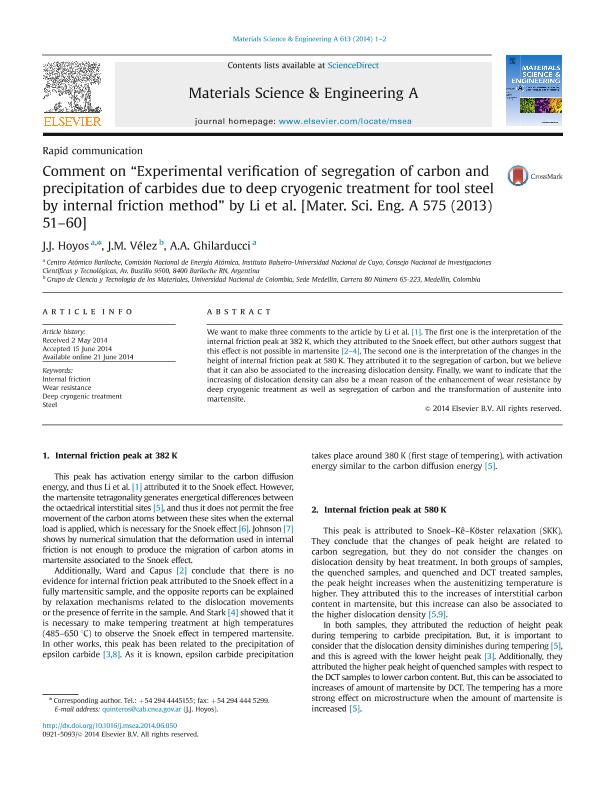Mostrar el registro sencillo del ítem
dc.contributor.author
Hoyos Quintero, John Jairo

dc.contributor.author
Velez, J.M.
dc.contributor.author
Ghilarducci, Ada Albertina

dc.date.available
2018-02-01T14:20:13Z
dc.date.issued
2014-06
dc.identifier.citation
Hoyos Quintero, John Jairo; Velez, J.M.; Ghilarducci, Ada Albertina; Comment on"Experimental verification of segregation of carbonand precipitation of carbides due to deep cryogenic treatment for tool steel by internal friction method" byLi et al.[Mater.Sci.Eng.A575(2013) 51-60]; Elsevier Science Sa; Materials Science and Engineering A: Structural Materials: Properties, Microstructure and Processing; 613; 2014; 6-2014; 1-2
dc.identifier.issn
0921-5093
dc.identifier.uri
http://hdl.handle.net/11336/35359
dc.description.abstract
We want to make three comments to the article by Li et al. [1].The first one is the interpretation of the internal friction peak at 382 K, which they attributed to the Snoek effect, but other authors suggest that this effect is not possible in martensite [2–4]. The second one is the interpretation of the changes in the height of internal friction peak at 580 K. They attributed it to the segregation of carbon, but we believe that it can also be associated to the increasing dislocation density. Finally, we want to indicate that the increasing of dislocation density can also be a mean reason of the enhancement of wear resistance by deep cryogenic treatment as well as segregation of carbon and the transformation of austenite into martensite.
dc.format
application/pdf
dc.language.iso
eng
dc.publisher
Elsevier Science Sa

dc.rights
info:eu-repo/semantics/openAccess
dc.rights.uri
https://creativecommons.org/licenses/by-nc-sa/2.5/ar/
dc.subject
Internal Friction
dc.subject
Wear Resistance
dc.subject
Deep Cryogenic Treatment
dc.subject
Steel
dc.subject.classification
Recubrimientos y Películas

dc.subject.classification
Ingeniería de los Materiales

dc.subject.classification
INGENIERÍAS Y TECNOLOGÍAS

dc.title
Comment on"Experimental verification of segregation of carbonand precipitation of carbides due to deep cryogenic treatment for tool steel by internal friction method" byLi et al.[Mater.Sci.Eng.A575(2013) 51-60]
dc.type
info:eu-repo/semantics/article
dc.type
info:ar-repo/semantics/artículo
dc.type
info:eu-repo/semantics/publishedVersion
dc.date.updated
2018-01-05T16:23:13Z
dc.journal.volume
613
dc.journal.number
2014
dc.journal.pagination
1-2
dc.journal.pais
Países Bajos

dc.journal.ciudad
Amsterdam
dc.description.fil
Fil: Hoyos Quintero, John Jairo. Consejo Nacional de Investigaciones Científicas y Técnicas; Argentina. Comisión Nacional de Energía Atómica. Gerencia del Área de Energía Nuclear. Instituto Balseiro; Argentina
dc.description.fil
Fil: Velez, J.M.. Universidad Nacional de Colombia; Colombia
dc.description.fil
Fil: Ghilarducci, Ada Albertina. Comisión Nacional de Energía Atómica. Gerencia del Área de Energía Nuclear. Instituto Balseiro; Argentina. Consejo Nacional de Investigaciones Científicas y Técnicas; Argentina
dc.journal.title
Materials Science and Engineering A: Structural Materials: Properties, Microstructure and Processing

dc.relation.alternativeid
info:eu-repo/semantics/altIdentifier/doi/http://dx.doi.org/10.1016/j.msea.2014.06.050
dc.relation.alternativeid
info:eu-repo/semantics/altIdentifier/url/http://www.sciencedirect.com/science/article/pii/S0921509314007679?via%3Dihub
Archivos asociados
